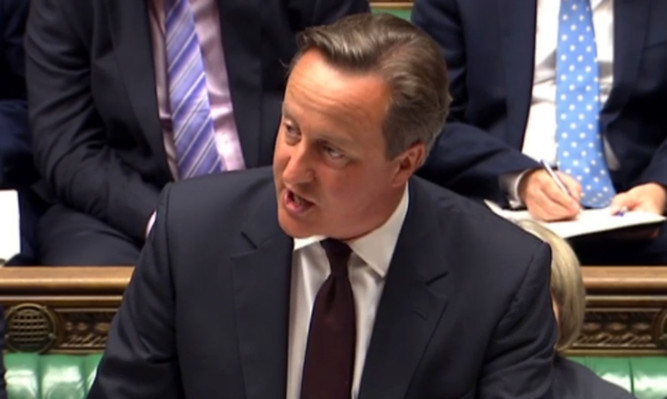The sight of hundreds of Germans lined up to welcome refugees from war-torn Syria was a truly heart-warming image after the months of tragic scenes from the migrant crisis gripping Europe.
Volunteers cheered and clapped, and handed out food and water, and toys and sweets to children as thousands arrived at Frankfurt station from Hungary, where they had been stuck for days.
The spontaneous kindness of ordinary people has humbled politicians and forced several of them to soften their tone on immigration. Our own Prime Minister is a case in point. Less than a week ago he was still treating the frightened families fleeing persecution as if they were economic migrants.
However, by Thursday he had belatedly picked up on the mood in this country, which had undergone a humanitarian shift in the face of so many distressing scenes on the continent.
Britain, which has historically been hospitable to dispersed people from around the globe, will take in up to 20,000 refugees over the next five years from the camps bordering Syria, Cameron announced on Monday.
It may not be a big enough amount to silence our critics in Germany, which is accepting thousands more, or even France, which has said it will take 24,000, but perhaps it will dispel more self-righteous elements at home.
Moral high ground
In the past few days there has been a race among the usual suspects to reach the moral high ground, with all the Labour leadership contenders offering their spare bedrooms to refugee families.
Bob Geldof has waded in, too: “I’m lucky. I have a place in Kent. I will take three Syrian families into my place in the country and one family into my flat in London.” And Natalie Bennett of the Green Party said she’d liked to help but only has a one-bedroom flat.
An online petition calling on landlords to extend their largesse had attracted 158 firm offers by Sunday night and more than 2,000 people have contacted a database asking for beds for those fleeing conflict.
And in Scotland, our own Nicola Sturgeon has promised to give up a room in her abode whether she means the publicly-owned Bute House in Edinburgh, spacious as a hotel, or her Glasgow pad.
Well intentioned as all these folk undoubtedly are, there is something slightly unedifying about the competitive compassion of celebrities and politicians. Without wishing to be too cynical, would Yvette Cooper or Jeremy Corbyn be so accommodating (literally) if they weren’t involved in a bitter battle to lead their party?
As David Simmonds, of the Local Government Association’s Asylum, Migration and Refugee Task Group, pointed out, there are already many, many families on waiting lists for council housing.
There are also always children looking for foster homes but there is less political mileage and more long-term commitment involved.
“It is very striking on the radio this morning people saying, ‘I have a spare bedroom, I will happily take a Syrian refugee’,” said Simmonds on Friday.
“But were these people ready yesterday to take any of those on the housing waiting list in their local area who may have been here for quite some time? If Bob Geldof is willing to make that offer, I’m sure his local council will be very happy to bring them around this afternoon.”
Here, it is easy for Scotland’s First Minister to say she cares deeply about the refugees she’d hardly be human if she didn’t and to attack the UK government as “shameful”. She convened a summit last week and has established a task force to ready Scotland for asylum seekers but this is merely for show.
Immigration policy is a reserved matter and therefore outside her control. She talks about the EU’s collective efforts yet she refuses to be part of her country’s collective effort although there is something she could do that would be much more useful than comparing her conscience to Cameron’s.
He at least is looking beyond the short-term and trying to address the reasons behind the exodus in the Middle East. The Tories have raised again the prospect of air strikes against Islamic State strongholds in Syria and Iraq, with George Osborne saying they would put the matter before the Commons if they were sure they would get a “different answer”.
Military intervention
Two years ago, the government lost a Westminster vote on sending in the RAF and today we are seeing the consequences of that lack of parliamentary nerve.
If the do-gooders now want to find a more lasting solution to the Syrian disaster, they must back military intervention if necessary. The Conservatives have a small majority and would need the votes of other parties. By marshalling her significant SNP cohort, Sturgeon could help the PM and in doing so bring hope to all those desperate people caught up in the eye of a storm.
